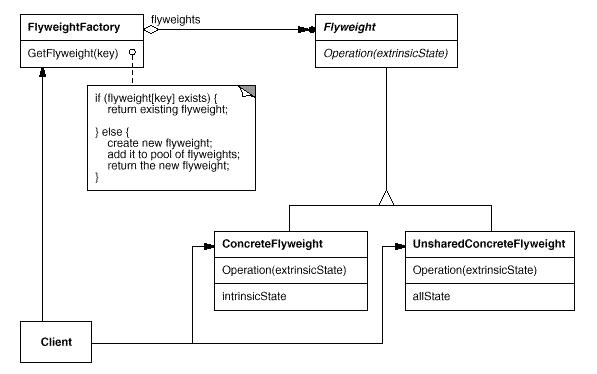作用:
運用共享技術有效地支持大量細粒度的對象。
UML結構圖:

解析:
Flyweight模式在大量使用一些可以被共享的對象的時候經常使用.比如,在QQ聊天的時候很多時候你懶得回復又不得不回復的時候,一般會用一些客套的話語敷衍別人,如"呵呵","好的"等等之類的,這些簡單的答復其實每個人都是提前定義好的,在使用的時候才調用出來.Flyweight就是基於解決這種問題的思路而產生的,當需要一個可以在其它地方共享使用的對象的時候,先去查詢是否已經存在了同樣的對象,如果沒有就生成之有的話就直接使用.因此,Flyweight模式和Factory模式也經常混用.
實現:
需要說明的是下面的實現僅僅實現了對可共享對象的使用,非可共享對象的使用沒有列出,因為這個不是Flyweight模式的重點.這裡的實現要點是采用一個list鏈表來保存這些可以被共享的對象,需要使用的時候就到鏈表中查詢是不是已經存在了,如果不存在就初始化一個,然後返回這個對象的指針.
1)Flyweight.h
/**//********************************************************************
created: 2006/07/26
filename: FlyWeight.h
author: 李創
http://www.cppblog.com/converse/
purpose: FlyWeight模式的演示代碼
*********************************************************************/
#ifndef FLYWEIGHT_H
#define FLYWEIGHT_H
#include <string>
#include <list>
typedef std::string STATE;
class Flyweight
{
public:
virtual ~Flyweight(){}
STATE GetIntrinsicState();
virtual void Operation(STATE& ExtrinsicState) = 0;
protected:
Flyweight(const STATE& state)
:m_State(state)
{
}
private:
STATE m_State;
};
class FlyweightFactory
{
public:
FlyweightFactory(){}
~FlyweightFactory();
Flyweight* GetFlyweight(const STATE& key);
private:
std::list<Flyweight*> m_listFlyweight;
};
class ConcreateFlyweight
: public Flyweight
{
public:
ConcreateFlyweight(const STATE& state)
: Flyweight(state)
{
}
virtual ~ConcreateFlyweight(){}
virtual void Operation(STATE& ExtrinsicState);
};
#endif
2)Flyweight.cpp
/**//********************************************************************
created: 2006/07/26
filename: FlyWeight.cpp
author: 李創
http://www.cppblog.com/converse/
purpose: FlyWeight模式的演示代碼
*********************************************************************/
#include "FlyWeight.h"
#include <iostream>
inline STATE Flyweight::GetIntrinsicState()
{
return m_State;
}
FlyweightFactory::~FlyweightFactory()
{
std::list<Flyweight*>::iterator iter1, iter2, temp;
for (iter1 = m_listFlyweight.begin(), iter2 = m_listFlyweight.end();
iter1 != iter2;
)
{
temp = iter1;
++iter1;
delete (*temp);
}
m_listFlyweight.clear();
}
Flyweight* FlyweightFactory::GetFlyweight(const STATE& key)
{
std::list<Flyweight*>::iterator iter1, iter2;
for (iter1 = m_listFlyweight.begin(), iter2 = m_listFlyweight.end();
iter1 != iter2;
++iter1)
{
if ((*iter1)->GetIntrinsicState() == key)
{
std::cout << "The Flyweight:" << key << " already exits"<< std::endl;
return (*iter1);
}
}
std::cout << "Creating a new Flyweight:" << key << std::endl;
Flyweight* flyweight = new ConcreateFlyweight(key);
m_listFlyweight.push_back(flyweight);
}
void ConcreateFlyweight::Operation(STATE& ExtrinsicState)
{
}
3)Main.cpp
/**//********************************************************************
created: 2006/07/26
filename: Main.cpp
author: 李創
http://www.cppblog.com/converse/
purpose: FlyWeight模式的測試代碼
*********************************************************************/
#include "FlyWeight.h"
int main()
{
FlyweightFactory flyweightfactory;
flyweightfactory.GetFlyweight("hello");
flyweightfactory.GetFlyweight("world");
flyweightfactory.GetFlyweight("hello");
system("pause");
return 0;
}